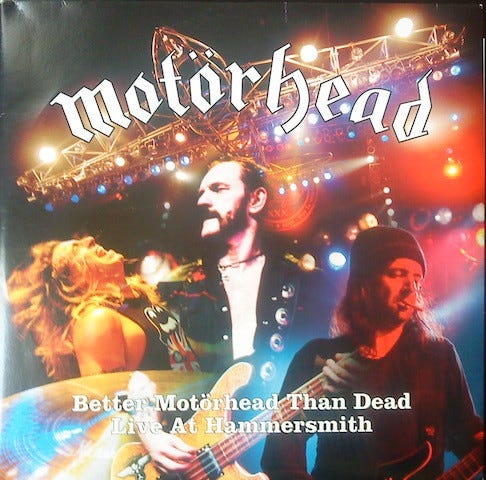"We Didn't Write For No Record Companies"
Part 2 of my interview with Motörhead's Phil Campbell
Greetings, Jagged Time Lapsers! Hope you had a righteous weekend, and haven’t been too badly thrown by the time change…
For those folks who are new to here — and thank you for joining the party! — I’ll just give you the heads-up that you’ll generally be able to access about 60-70 percent of my posts for free. But if you pony up a mere five dollars per month (or $4.17 if you take advantage of the annual subscription discount), you’ll be able to read everything I publish here, as well as everything that already resides in the JTL archives. This includes some of my favorite interviews that I’ve done over my thirty years as a music journalist, most of which have never been published in their entirety… UNTIL NOW.
Case in point — my extensive 2021 interview with Phil Campbell, the longest-serving guitarist in Motörhead history. In Part 1, published here last week, we spoke about how Phil first met Lemmy when the latter was still Hawkwind’s bassist and the former was just an 12 year-old Hawkwind fan, of how he came to join Motörhead a decade later, and why he and Lemmy were so bitterly disappointed with 1986’s Orgasmatron LP. You can read it here…
In Part 2, we cover drummer Mikkey Dee’s entrance, the departure of Phil’s longtime guitar partner Würzel, the band’s difficulties with record companies, what kind of music Lemmy generally liked to listen to on the tour bus (hint: it wasn’t punk or metal), Motörhead’s legacy, and so much more. Read on if you dare…
Mikkey Dee initially came in to help you guys finish up the sessions for 1992’s March ör Die, then officially joined the band for that tour. What made you realize that he was the right guy for the drummer position?
Well, me and Lem, we remembered him from King Diamond. They us supported us in 1985 or ’86 or something like that. And Mikkey was a spectacular drummer then. I think Lem managed to get a hold of him because he was with Dokken at the time, but I don't think Dokken were doing much. Mikkey came over to Musicgrinder Studios up on Hollywood Boulevard, and he fitted in great. The worse his hangover was, the greater he would play! [laughs] At the soundcheck he’d be like, “Oh, my head feels like shit!” and then he’d come on and be incredible. But that was great when we got together with him, yeah, and it stuck for so many years.
Mikkey was a much showier player with King Diamond and Dokken, but he found a way to dial it down with Motörhead while still retaining the personality in his playing.
Yeah, he knew how to slip in some bits that we wouldn't have necessarily thought of — a little three-four timing or something just a little bit different — because he was used to a lot of technical stuff as well. But also, Mikkey can slam out the straight beat like no one. But we all had the same vision of what we wanted the band to sound like, and we knew it was pointless trying to stray off that too much. We’d do the odd one or two acoustic songs and things like that, but we didn't wanna change the band’s sound or direction, really. It was a unique thing, but Mickey fitted in great. And the sense of humor he had as well with the three of us, it was remarkable — we had the best time imaginable, really. [laughs] We’d have a great laugh all day, and our gigs were incredible. We very, very rarely had a bad gig; I can count them on like one hand, probably.



